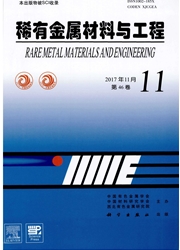

 中文摘要:
中文摘要:
材料成形过程中,一个备受关注的问题是能否实现在不发生开裂的基础上达到要求的变形。本实验基于热压缩实验(变形温度为1123-1373 K,应变速率为0.01-10 s^-1,变形量为70%)获得的开裂样本,证实了铸态Ti40合金的主要开裂模式为45°剪切开裂、自由表面纵向开裂和内部三叉晶界沿晶开裂。借助SEM重点分析了变形参数对开裂机制的影响规律,发现在低温1123 K变形时,主要是穿晶解理脆性断裂,1273 K变形时,转变为韧性断裂,高温1373 K变形时,大量的小韧窝被观察到;应变速率对铸态Ti40合金的开裂行为也具有重要影响,在低应变速率0.01 s^-1变形时,样本没有发生开裂,在0.1和1 s^-1变形时,在开裂表面观察到大量的韧窝,属于韧性开裂,在高应变速率10 s^-1变形时,开裂表面呈现脆性开裂特征。最后深入探讨了铸态Ti40合金的损伤机制和开裂原因,绘制了铸态Ti40合金的开裂原理图。
 英文摘要:
英文摘要:
An important concern in forming is whether the desired deformation can be accomplished without cracking or fracture of the work material. In this research, based on the cracking specimens obtained from hot compression experiment, the fracture behavior of as-cast highly β stabilized Ti40 alloy was investigated at the deformation temperatures of 1123-1373 K, strain rates of 0.01-10 s^-1 and height reduction of 70%. The main fracture modes consist of 45° shear fracture and longitudinal cracking occurring on flee-surface, as well as inner cracking occurring at the triple boundary junctions. Moreover, the influence of deformation parameters on fracture mechanism was analyzed emphatically in terms of SEM. At low temperature of 1123 K the transgranular cleavage brittle fracture is observed; at 1273 K the ductile fracture occurs; at high temperature of 1373 K a lot of small dimples on the fracture interface are examined. Furthermore, the effect of strain rate on the fracture behavior of as-cast Ti40 alloy is significant. At 0.01 s^-1, the fracture des not occur. At the strain rates of 0.1 and 1 s^-1, the fracture surface is covered with a large amount of dimples indicating that the fracture mode is ductile fracture, while at high strain rate of 10 s^-1, the fracture surface shows a brittle fracture feature. Finally, the damage mechanism and fracture reason were discussed and fracture principle diagram was drawn for the as-east Ti40 titanium alloy.
 同期刊论文项目
同期刊论文项目
 同项目期刊论文
同项目期刊论文
 Modeling the correlation between microstructure and the properties of the Ti-6Al-4V alloy based on a
Modeling the correlation between microstructure and the properties of the Ti-6Al-4V alloy based on a Comparative study on constitutive relationship of as-cast Ti60 titanium alloy during hot deformation
Comparative study on constitutive relationship of as-cast Ti60 titanium alloy during hot deformation Prediction of flow stress in isothermal compression of Ti60 alloy using an adaptive network-based fu
Prediction of flow stress in isothermal compression of Ti60 alloy using an adaptive network-based fu Determination of the friction factor of Ti-6Al-4V titanium alloy in hot forging by means of ring-com
Determination of the friction factor of Ti-6Al-4V titanium alloy in hot forging by means of ring-com Artificial neural network approach to predict the flow stress in the isothermal compression of as-ca
Artificial neural network approach to predict the flow stress in the isothermal compression of as-ca Effect of processing parameters on hot deformation behavior and microstructural evolution during hot
Effect of processing parameters on hot deformation behavior and microstructural evolution during hot Characterization of high-temperature deformation behavior of as-cast Ti60 titanium alloy using proce
Characterization of high-temperature deformation behavior of as-cast Ti60 titanium alloy using proce 期刊信息
期刊信息
